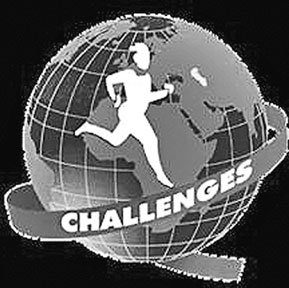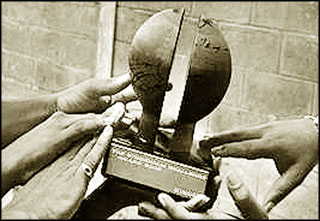Challenge of public administration
Deepanie PERERA
 Sri Lanka is at a decisive crossroad in breaking through some
conservative and long outdated thinking as we steadily march towards
simultaneous transformations in several fronts ie: social, economic and
political prosperity. This is no easy march. As the paradigms shift, for
a nation who had waged a civil war for nearly three decades, will have
to deal with boundless and limitless challenges, but the magic formula
as always would remain in unwavering optimism, which is a challenge in
itself to sense, size and seize those great opportunities for a better
standard of life. Sri Lanka is at a decisive crossroad in breaking through some
conservative and long outdated thinking as we steadily march towards
simultaneous transformations in several fronts ie: social, economic and
political prosperity. This is no easy march. As the paradigms shift, for
a nation who had waged a civil war for nearly three decades, will have
to deal with boundless and limitless challenges, but the magic formula
as always would remain in unwavering optimism, which is a challenge in
itself to sense, size and seize those great opportunities for a better
standard of life.
Vision
'An excellent public service for the nation'
This being the published vision statement of the Ministry of Public
Administration, 'excellence' is to be desired, if excellence is an
espoused state. Does the current public administration machinery operate
like a business? Is the citizenry treated as customers? In my view, if
and when we could answer these two questions with an undisputed 'yes'
only then could we boast of the above.
The public administration machinery is the largest single employer in
the country accounting for approximately 25 percent of the nation's work
force. Thus serving as a key strength from which many synergies could be
drawn; from among the very rich knowledge capital made of employees who
are professionals, academics, scholars, practitioners, etc. led by
visionary and trusted political leadership. A well structured policy
framework and procedures is yet another strength that enable operational
discipline, though is not a panacea for all ills.
With the civil war ending, the nation remains at an emotional high,
and the support towards building this nation from all countrymen
including those who are abroad, is overwhelming to say the least. Along
with it comes aid, not only in monetary but in other forms.
Optimisation
There is a great opportunity for the optimisation of such funds. The
year 2009 being the year of ICT, poses much opportunity to engage ICT
effectively throughout Sri Lanka that would open many more windows of
opportunity. Introducing an effective social security system for all Sri
Lankans would be an important indicator towards measuring our
development. It is imperative that a prudent mechanism employs effective
delivery tools, again chiefly engaging ICT. Like no other time in our
history, we have the support of the international community at this very
important juncture of our nation.
It is a known fact that our public service is over crowded due to
haphazard appointments, also giving rise to complacency crippling the
system more often than not. A synergistic approach is hardly present and
the public service looks more inward than outward - an inside out
approach. As a result they fail to operate in a true business like way
and the public who are the customer is often treated poorly.
Innovation and creativity
There is no room or very little room in the current system for
innovation and creativity, which go hand in glove in delivering service
excellence.
The lack of strong and compelling guiding principles in the form of
personal and organizational values give rise to compromised integrity
which in turn plagues the entire public service.
Only a 9 percent of the public servants are familiar with the Tamil
language, creating yet another problem; apart from near absence if not
lack of transparency. These challenges got to be dealt with and overcome
in a collaborative and well planned structured approach.
Needless to mention the weaknesses would expose us to threats that
could endanger the nation and the state.
Disgruntled public would obviously treat the state unfavourably,
particularly when it is incumbent upon them during the time of
exercising their democratic right - at elections. Not only the loss of
productivity will negatively impact the GDP it would also slow and
impede the development process dramatically.
The entire public service should share in the vision - this is the
very first step. They should own up to it. Only then will they live up
to it. Revision of the above vision statement is prudent at this point.
Therefore, it is an opportune moment to have a crosssection of the
public service involved and collaborate to re-construct one. Inviting
the public too is a good idea. eg : superior service delivery for the
nation, in a mutually rewarding partnership This could be for the short
term ie: 2 - 3 years at which point reorientation is necessary with a
more ambitious statement.
All public servants must fully understand and be accustomed with the
objectives at national level, department level and individual level with
key performance indicators (KPIs) assigned to individuals to measure
results. This would harness a results oriented - performance based
public service culture.
Customer (public) centricity
In order to provide a truly satisfying public service, web based
automation is pivotal. The public should be able to go online to get
their jobs done, while being able to real time track the status of a
job, similar to other developed nations. To name a few services -
obtaining a passport, obtaining a national identity card, renewing a
driver's license, fixing a street lamp, collect pensions, paying tax,
etc.
 An interactive online forum for suggestions and complaints too is
important with dedicated staff to handle them. Help line telephone
service too could add great value to the public and uplift the image of
the service. This is already implemented in some departments and
ministries. An interactive online forum for suggestions and complaints too is
important with dedicated staff to handle them. Help line telephone
service too could add great value to the public and uplift the image of
the service. This is already implemented in some departments and
ministries.
Considering an effective social security system particularly for non
pensioners would improve the standard of life of the citizens in this
march towards development.
Financial, material and human resources should be employed optimally.
In terms of human resources, the current structures must be critically
evaluated and right sized/restructured accordingly.
Even though the one time cost for this as compensation, and other
severance packages would be high, on the long run this would stand the
nation in good stead as it won't be a recurrent cost on unnecessary
cadre.
Human Resource (HR) management and development
Introducing a values system is probably one of the hardest chores. A
possible approach is to blend with already existent personal values.
The public servants should visibly live the values in an
uncompromising way; this should be recognized and rewarded. This way, by
positively reinforcing positive behaviour will help sustainability.
A common Human Resource Information System (HRIS) is a highly
recommended tool to better manage HR.
It could be on a common platform, with customization if and when
necessary (for different departments and services). A project team
consisting of a cross section of personnel could be involved in
developing an in-house HRIS with modules such as master file (similar to
personal files), recruitment and selection, employee life cycle,
performance management, training and development, compensation and
rewards, succession planning, etc.
At least a good 90 percent of manual work could be eliminated saving
costs and HR staff could be relieved from operational work to focus more
on strategic matters such as training and development. HR could be
integrated with other processes. Ability to track HR information on line
for management decisions from anywhere in the world is a real plus.
The recognition of good service performance would drive the service
towards a service oriented performance based culture. The rewards could
be either financial or non-financial eg: incentives, bonuses, awards,
certificates, etc.
SLIDA
Sri Lanka Institute for Development Administration (SLIDA) together
with other training institutes needs to play a bigger role in training
and developing the public servants in a well structured approach.
Approximately only a 9 percent of today's total public servants speak
Tamil. In order to engage the official languages policy, it is critical
that a decent percentage of the public sector learn to communicate in
Sinhala and Tamil. To this extent language training - Tamil for
Sinhalese and Sinhala for Tamils is a must. Whilst Sri Lanka is quite
backward in being open and candid, whistle-blowing should be encouraged
for greater transparency and to eliminate corruption.
ICT literacy among the public and public servants is a dire need. All
citizens should have access to a computer. Taking ICT to all 9 provinces
is a must. Expertise could be drawn from IT related departments and IT
specialists both within and outside the public sector. This would auger
well towards service excellence when the machinery is automated.
Revisiting the current policy framework and procedures and revision
would be necessary.
The service should be managed in a transparent manner. Shared
services at national and regional level could be centralized resulting
in synergies thus breaking the silos. At the same time, duration/time
lines for jobs should be predetermined as standards, that are made known
to the public.
Sri Lanka has been ranked 44 among 60 nations against
competitiveness. Greater improvements are required in transparency,
policy and bureaucracy, infrastructure, technology and management.
Balanced scorecard
 We can learn from developed nations. We must. We should benchmark
against such nations and establish our own standards by capitalising on
bilateral relationships with such nations. We could even draw expertise
on exchange agreements and programs. We can learn from developed nations. We must. We should benchmark
against such nations and establish our own standards by capitalising on
bilateral relationships with such nations. We could even draw expertise
on exchange agreements and programs.
The balanced scorecard (BSC) (Figure I below) is recommended for the
management and measurement of the KPIs. It is a management system
founded by Drs. Robert Kaplan and David Norton of the Harvard Business
School, in the 1990s. It would capture the following 4 perspectives.
1. The learning and growth perspective
2. The business process perspective
3. The customer perspective
4. The financial perspective
Communication Communicate...communicate...communicate - this is one
powerful and secret weapon for success. Whilst not blowing matters out
of proportion, actual and realistic, real time communication is of
paramount importance for success.
It educates the public and the public servants of achievements of the
public service whilst portraying a good picture about the service and
the nation at large. This would be the litmus test and bear fruit for
the efforts of the public administration of a nation towards a
developing paradigm and an exemplary story for the rest of the world. In
other words, another Singapore. And particularly, in branding 'Sri
Lanka'.
The writer is currently a freelance Business Consultant, HR
Specialist and a Corporate Trainer/ Lecturer; and serves as consultant
to several companies.
THE CHRONOLOGY OF LTTE TERROR will be published tomorrow.
Strengths Opportunities
Human capital Strong collaborative support of the
citizenry including Sri Lankan
diaspora
Financial aid
Opportunity to engage Information
and Communication Technology
(ICT) for development
Introduce an effective social
security system
Availability of effective service delivery tools
International recognition and support
Weaknesses Threats
Over crowded public administration Political downside
network
Complacency Lost national productivity
Inward looking Disgruntled citizenry
Lack of synergy Slowing of development
Lack of business like mindset
Lack of opportunity for innovation
and creativity
Lack of personal and organizational
values
Compromised integrity
Official languages problem
Lack of transparency |



